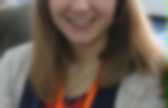

The funniest TED Talks. Now playing The New Yorker receives around 1,000 cartoons each week; it only publishes about 17 of them.
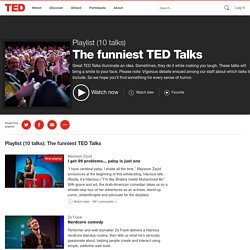
In this hilarious, fast-paced, and insightful talk, the magazine's longstanding cartoon editor and self-proclaimed "humor analyst" Bob Mankoff dissects the comedy within just some of the "idea drawings" featured in the magazine, explaining what works, what doesn't, and why. Yann Dall'Aglio: Love. Talks that just might save your relationship. Now playing Infidelity is the ultimate betrayal.
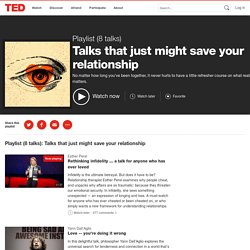
How to learn a new language: 7 secrets from TED Translators. Charming talks for a boost on a bad day. AJ Jacobs: My year of living biblically. Get in shape (for real this time) Julian Treasure: How to speak so that people want to listen. Talks to inspire New Year's Resolutions. Marco Tempest: The electric rise and fall of Nikola Tesla. Talks to watch when every conceivable bad thing has just happened to you. Sheena Iyengar: How to make choosing easier. Talks to watch instead of shopping. Marco Tempest: The electric rise and fall of Nikola Tesla. 25+ apps that the TED staff swears make their everyday lives easier. At our small, fast-moving nonprofit company, everyone does a couple of jobs — and productivity apps help us manage roles that shift between coding, writing/designing and running a full-scale conference twice a year.
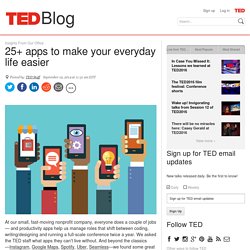
We asked the TED staff what apps they can’t live without. And beyond the classics—Instagram, Google Maps, Spotify, Uber, Seamless—we found some great apps that might help you too. (A star denotes that the app is free, or at least has a free version.) For random life stuff… Dark SkyA weather app with startling accuracy, its interface tells you things like: “Light rain starting in 22 minutes.”
*SunriseLike your Google Calendar with key improvements, several staffers swear by this app. *KeyMeCommunications manager Samantha Kelly was excited to download this app, as she recently got locked out of her apartment. *Think DirtyThis app tells you exactly what’s in the personal care product you’re about to buy. *Camera360This app has more than 200 photo filters and 10 modes. Jill Shargaa: Please, please, people. Let's put the 'awe' back in 'awesome'
How to turn small talk into smart conversation. Imagine almost any situation where two or more people are gathered—a wedding reception, a job interview, two off-duty cops hanging out in a Jacuzzi.
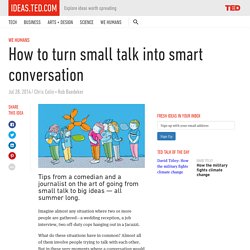
What do these situations have in common? Almost all of them involve people trying to talk with each other. But in these very moments where a conversation would enhance an encounter, we often fall short. We can’t think of a thing to say. Charming talks for a boost on a bad day. Charming talks for a boost on a bad day. Now playing All under the age of 16, brothers Jonny, Robbie and Tommy Mizzone are from New Jersey, a US state that's better known for the rock of Bruce Springsteen than the bluegrass of Earl Scruggs.
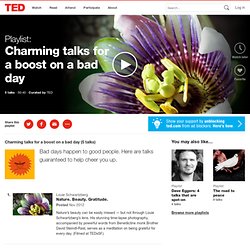
Nonetheless, the siblings began performing bluegrass covers, as well as their own compositions, at a young age. Here, they play three dazzling songs in three different keys, passing the lead back and forth from fiddle to banjo to guitar. Graduation…now what? Now playing Clinical psychologist Meg Jay has a bold message for twentysomethings: Contrary to popular belief, your 20s are not a throwaway decade.
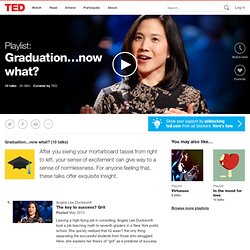
In this provocative talk, Jay says that just because marriage, work and kids are happening later in life, doesn’t mean you can’t start planning now. She gives 3 pieces of advice for how twentysomethings can re-claim adulthood in the defining decade of their lives. “In your 20s, you may not get married or figure out exactly what career you want to pursue. Andrew Solomon: How the worst moments in our lives make us who we are. The best stats you've ever seen - Hans Rosling. Rosling is a passionate advocate for “liberating” publicly-funded data on the Internet.
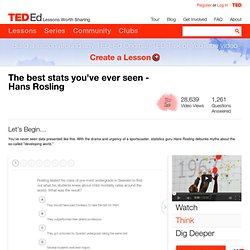
Select one topic area for which country-specific data might be compared (e.g., education, health, food production, the environment, etc.), and identify what you think are the best sources of data in this area on the Internet. Create a guide that lists these sources, and provides a brief review of each. If the administrators of these data repositories are thinking about how users might engage with the data via mobile devices or social media, note this in the review.
If the administrators currently aren’t doing anything in these areas, how could mobile devices and social media enhance the user’s experience? Here are a few resources to make learning statistics an interesting experience. Someone always asks the math teacher, "Am I going to use calculus in real life? " How to read music - Tim Hansen. 7 talks on how we make choices. Now playing Over the years, research has shown a counterintuitive fact about human nature: That sometimes, having too much choice makes us less happy.
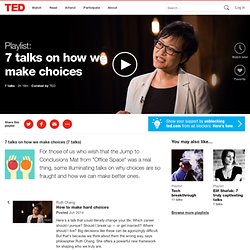
This may even be true when it comes to medical treatment. Baba Shiv shares a fascinating study that measures why choice opens the door to doubt, and suggests that ceding control — especially on life-or-death decisions — may be the best thing for us. Dan Gilbert: The psychology of your future self. Amy Cuddy: Your body language shapes who you are. How do you solve a problem like the climate crisis? Ken Robinson: Bring on the learning revolution! Population pyramids: Powerful predictors of the future - Kim Preshoff. If your selected country was not represented by a population pyramid in the lesson, you may wonder what it looks like.
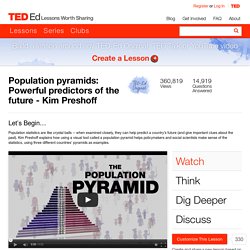
The U.S. Census Bureau has an International Data Base that can help you create one. Is your country a fast, slow or no growth pyramid? The current world population can be seen ticking on the World Population Clock. Factors such as better water, food, medicine, industry, and health care have caused the world population to grow exponentially. Elizabeth Gilbert: Success, failure and the drive to keep creating. How to tell a story. Kamal Meattle: How to grow fresh air. Make the most of your 20s: Meg Jay at TED2013. In her 20s, Meg Jay saw her first psychotherapy client, Alex, who was there to talk about her guy problems.
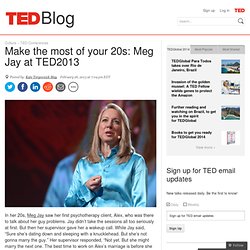
Jay didn’t take the sessions all too seriously at first. But then her supervisor gave her a wakeup call. While Jay said, “Sure she’s dating down and sleeping with a knucklehead. But she’s not gonna marry the guy.” Dan Pink: The puzzle of motivation. Ash Beckham: We're all hiding something. Let's find the courage to open up. Sam Harris: Science can answer moral questions. Wendy Chung: Autism — what we know (and what we don’t know yet) The art of science: Stunning, psychedelic images from Fabian Oefner. In his TEDGlobal 2013 talk, Fabian Oefner shares breathtaking images at the nexus of art and science, which beautifully capture unique moments of physical and chemical drama. Formally trained in art and design, Oefner says that he has always been interested in science. Though he can’t pinpoint the exact moment when he became interested in pairing his two loves, he views both pursuits as inextricably linked by a crucial bond: “The most important quality of science or art is curiosity,” Oefner tells TED.
“That’s what keeps me going and always finding something new.” Marbelous No. 05 (2013) An unusual look at the properties of oil, as colorful marbles of oil paint float in a solution of water and methylated spirits. Grain of Scent (2013) Russell Foster: Why do we sleep? Joshua Foer: Feats of memory anyone can do. Larry Smith: Why you will fail to have a great career. Kelly McGonigal: How to make stress your friend. Simon Sinek: How great leaders inspire action.
Colin Stokes: How movies teach manhood.